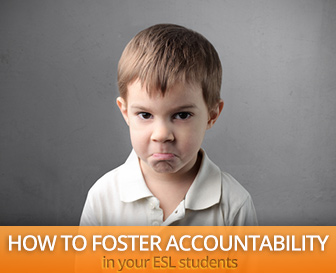Accountable: (of a person, organization, or institution) required or expected to justify actions or decisions; responsible – from The New Oxford American Dictionary
In sports, the coach gets most of the credit when the team wins – but also most of the blame when the team loses. The same thing happens with ESL teachers.
How many times have we heard students or their parents complain about how they’re not learning or how badly they did on a test? We all know what we are responsible for; we know what we need to teach, we know we need to plan, and we try our best to encourage and motivate our students. But students need to pull their own weight. If you often find yourself being held accountable for either your students’ successes or failures, maybe it’s time to help them become more accountable for their own work.
And here’s what you must help them understand:

How to Foster Accountability in Your ESL Students
-
1
It is their responsibility to do their best in class
It is the teacher’s responsibility to prepare lessons that not only cover what it is we have to essentially teach, we must also do our best to engage learners in our efforts to teach them. However, it is our students’ responsibility to be open to what we propose and give it their best effort. We have all had out share of students who were not interested no matter how hard we tried. They didn’t listen. They didn’t care. Yes, we must try to make classes as interesting as we can, but students must also try to be receptive and positive. It’s a two-way street.
-
2
It is their responsibility to do the homework
So, students show up for class and participate in all of the activities we propose. But it can’t end there. They must continue the work we do in class – at home. We are responsible for assigning it; they are responsible for doing it. They may choose not to do any homework at all. But they must understand that if they don’t get the results they expected, they are fully accountable for it.
-
3
It is their responsibility to come to class
Adult learners in particular may have issues with attendance. They have meetings, their kids’ dance recitals or sports events to attend, or are just too tired to show up for class. But they are responsible for showing up. If they are consistently absent to class, they must bear the consequences – they will not get the return on the investment for the classes they paid for.
-
4
It is their responsibility to behave in class
This is a main issue with children. Of course, we are responsible for maintaining order and enforcing the rules – we are the authority figure in a classroom. Remind the children that the rules you are enforcing are the rules you established together as a group. But children must also understand at some point that they must behave in order to listen, pay attention and learn. It is their responsibility to behave so that they can learn.
-
5
It is their responsibility to prepare and sit for the tests
Students take an ESL course and expect to magically be ready for an international examination. We are responsible for guiding them, and giving them the tools and strategies they need to succeed. But it is their responsibility to accept them and put them to use. They must prepare in their own time and when the time comes, show up and sit for the exam. We can’t always be there to hold their hand.
-
6
It is their responsibility to do the work
“Doing the work” involves everything mentioned above and more. It’s turning off the subtitles when they watch a movie. It’s taking a practice test instead of watching a movie. It’s getting up early to study a bit more. We are merely instructors; we instruct them on what to do, but they are the ones who must do.
And yet… “you can lead a horse to water but you can’t make it drink.”
You can explain to them the importance of being responsible for their ESL studies, but you can’t make them do the work unless they really want to.
We must also consider that the degree of accountability is often directly proportional to your students’ ages. That is, the older they are, the more accountable they are for their failures or successes. But I still believe it is important to foster accountability in students, even at an early age. We should not underestimate young learners. They are capable of more responsibility than we usually give them credit for.
I’ve been blessed enough to have students and parents who were willing to share the workload, the responsibility and the accountability. There have been times when a student I personally tutored did not pass a major international examination. Did the parents come charging at me, throwing accusations about how I failed to teach their kid? Not at all. They were understanding and held the child accountable for not going that extra mile that had been needed to pass the test. “We’ll try again next time”, they said.
What has been your experience with student accountability?
P.S. If you enjoyed this article, please help spread it by clicking one of those sharing buttons below. And if you are interested in more, you should follow our Facebook page where we share more about creative, non-boring ways to teach English.







